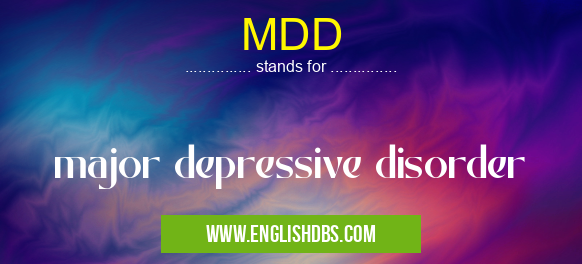What does MDD mean in MEDICAL
Major Depressive Disorder (MDD) is a mental health disorder characterized by persistently depressed mood, low self-esteem, and a lack of interest or pleasure in many activities. It can cause physical and psychological symptoms that impact all areas of an individual's life, including work, relationships, and leisure activities. MDD is more than simply feeling sad; it affects how individuals think, feel, and cope with everyday problems. When MDD is not treated, it can severely reduce an individual's quality of life.

MDD meaning in Medical in Medical
MDD mostly used in an acronym Medical in Category Medical that means major depressive disorder
Shorthand: MDD,
Full Form: major depressive disorder
For more information of "major depressive disorder", see the section below.
What MDD Means
MDD stands for Major Depressive Disorder, which is a mental health disorder that has been classified as an affective disorder by the American Psychiatric Association. People with MDD experience persistent depressed moods and difficulty finding pleasure in activities they once enjoyed, as well as bouts of hopelessness or worthlessness. In addition to impacting emotional wellbeing, symptoms of MDD can also be physical. These can include changes in appetite or sleep patterns and fatigue.
Diagnosis of MDD
An official diagnosis of MDD may require a psychiatric evaluation during which the doctor will ask questions about family history and evaluate the patient's current psychological state. They may also conduct tests to rule out any other medical conditions that could be causing the symptoms. A diagnosis typically occurs if a patient experiences 5 or more symptoms for 2 weeks or longer within the same 2-month period according to the criteria set forth in the DSM-IV-TR diagnostic manual published by the American Psychiatric Association.
Treatment Options for MDD
Treatment options for major depressive disorder vary depending on severity and individual needs but generally include some combination of psychotherapy, medicinal therapies such as anti-depressant medications (SSRIs), lifestyle changes such as regular exercise and adequate sleep hygiene, social support from family members or friends, journaling practices such as mindfulness meditation or cognitive behavioral therapy (CBT). Fortunately with appropriate treatment most people find relief from their depression symptomology.
Essential Questions and Answers on major depressive disorder in "MEDICAL»MEDICAL"
What is major depressive disorder?
Major depressive disorder (MDD) is a type of mood disorder that causes persistent sadness, feelings of worthlessness, loss of interest in activities you used to enjoy, fatigue, and difficulty concentrating. MDD can affect a person's ability to carry out day-to-day activities.
What are the symptoms of MDD?
Common symptoms of MDD include depressed mood, feelings of worthlessness or guilt, problems sleeping or sleeping too much, difficulty focusing on school or work tasks, changes in appetite leading to weight gain or loss, physical agitation or slowing down of movements, and recurring thoughts of death or suicide.
How is major depressive disorder diagnosed?
To diagnose MDD, a doctor will typically conduct an assessment that includes gathering information from both the patient and family members as well as psychological testing. The doctor may also order lab tests to rule out other possible medical conditions such as thyroid disease.
How is MDD treated?
Treatment for major depressive disorder usually involves psychotherapy and/or medications. Treatment options may include individual counseling sessions with a therapist; group therapy; cognitive behavioral therapy; medication such as antidepressants; or a combination thereof.
Is MDD a lifelong condition?
Major depressive disorder can be recurrent but it’s not necessarily lifelong. Many people find that with appropriate treatment and support they are able to manage their symptoms fairly well and even go into remission in some cases.
Can children have major depressive disorder?
Yes, although depression is more common among adults than youth and adolescents can suffer from major depressive episodes too. Common signs in children can include withdrawing from social activities they once enjoyed, having difficulty concentrating on schoolwork or hobbies, feeling overwhelmed by feelings of hopelessness and despair more days than not.
Are there any herbal remedies for treating depression?
While there are some herbs like St John’s wort that have been studied for treating depression, these products are not regulated by the FDA so it’s important to exercise caution when using them and consult with your physician first as they can interact with certain medications you might be taking. Professional treatment should always be accessed before trying herbal remedies alone.
Does exercise help treat depression?
Yes! Exercise has been shown to improve mental health conditions including depression since it releases endorphins which act as natural painkillers that help reduce stress and promote relaxation. Aiming for 30 minutes of moderate physical activity at least three times per week is recommended to see therapeutic benefits.
What self-care strategies can I use when dealing with depression?
Eating healthy meals throughout the day; getting 7-8 hours of sleep each night; staying active by going outside for walks or doing light exercises; scheduling time for yourself to relax through reading books or listening calming music; talking about your feelings to those close friends ;and practicing mindfulness like deep breathing exercises are all helpful tools when managing difficult emotions brought on by depression.
Final Words:
MDD is a potentially serious mental health condition that can have significant impacts on daily life if left untreated. Fortunately there are many effective treatment options available to reduce or eliminate its symptoms so individuals suffering from depression can work towards finding happiness again. With proper diagnosis and direction from healthcare professionals those battling this disorder don’t need to suffer alone anymore!
